Politics
Timeline of key events behind Sheikh Hasina’s death sentence
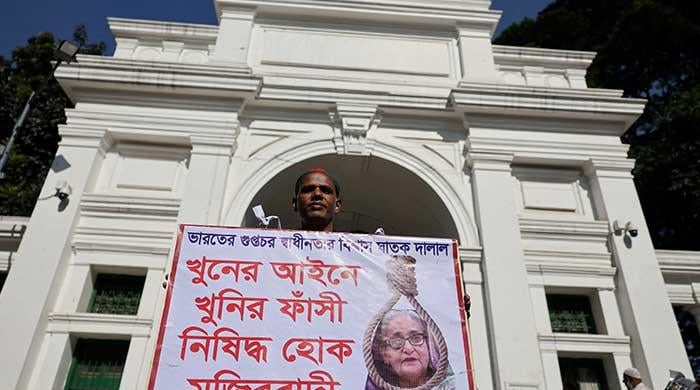
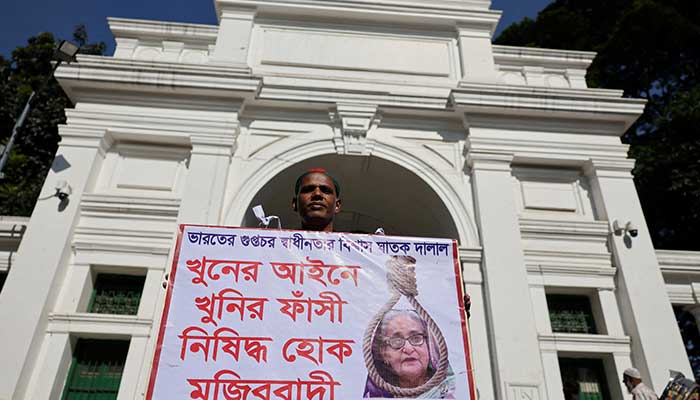
A Bangladesh court sentenced ousted Prime Minister Sheikh Hasina to death on Monday, concluding a months-long trial that found her guilty of ordering a deadly crackdown on a student-led uprising last year.
The Muslim-majority South Asian country of 170 million people has grappled with instability since Hasina fled to India in August 2024 at the height of the uprising. Here are the key events:
Deadly protests
Protesters led by the “Students Against Discrimination” group initially wanted quotas in public sector jobs, but the movement escalated in July 2024 as they demanded Hasina’s resignation and clashed with security forces and supporters of her Awami League party.
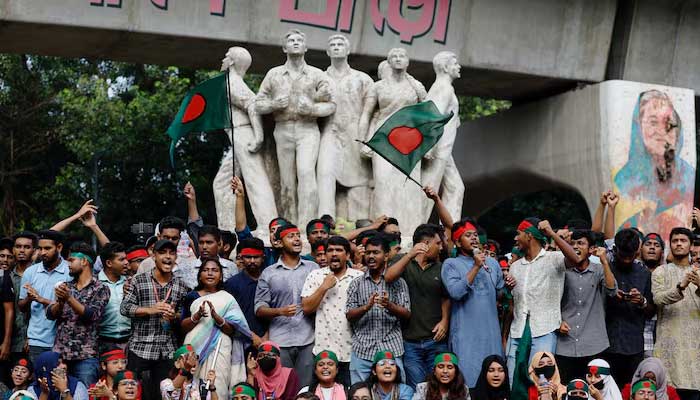
Protesters blamed the government for a crackdown that killed hundreds of people and injured thousands with unrest peaking on August 5 when Hasina was forced to flee to neighbouring India just before crowds stormed her official residence. She has stayed since in the Indian capital New Delhi.
Yunus as de facto PM
An interim government was formed and tasked with restoring stability and preparing for parliamentary elections. Nobel laureate Muhammad Yunus, 85, took charge as de facto prime minister.
Elections will be held in early February, he has said.
The interim government promised sweeping institutional reforms but progress has been slow and fragmented, despite broad consensus on key reforms such as restoring a non-partisan caretaker government to oversee elections, depoliticising state institutions and overhauling the Election Commission.
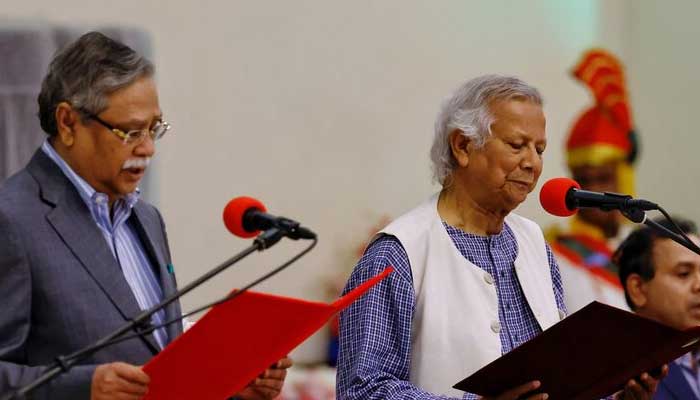
But deeper reforms have stalled in the face of sharp disagreements between political parties over proposals for constitutional change, judicial reform and introduction of a bicameral parliament.
Political analysts have pointed to a widening gap between public expectations and outcomes.
Elections
Yunus’ government is caught between the need for reform and pressure for early elections, its biggest challenge.
Further strain has been added by the controversy over the exclusion of Hasina’s Awami League party, after its registration was suspended, effectively barring it from contesting.
Many want it to participate, despite its top leadership being prosecuted for alleged violations of human rights during the protests. Without broad political inclusion, the legitimacy of a vote could be suspect.
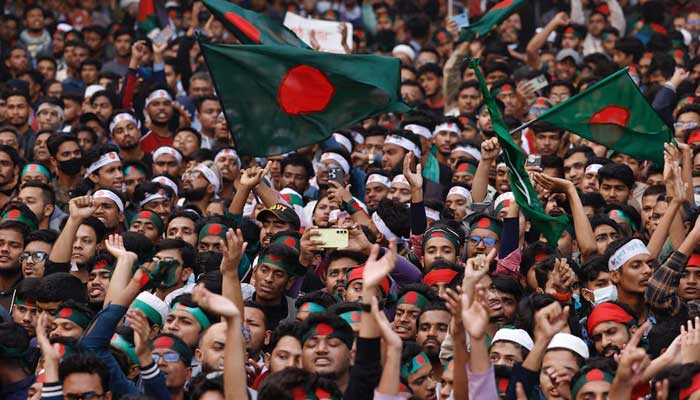
The newly formed National Citizen Party (NCP), born out of the 2024 protests, is viewed by critics as being favoured by Yunus’ administration, which the government denies. But the suspicion could also cloud the credibility of the vote.
Fragility
Law enforcement remains a challenge. Political violence, mob attacks and harassment of journalists and minorities, especially women, are regularly reported.
Mob violence claimed at least 261 lives between August 2024 and October 2025, says rights group Ain o Salish Kendra.
New York-based Human Rights Watch warns that while some authoritarian practices have ended, the interim government has adopted troubling tactics of its own.
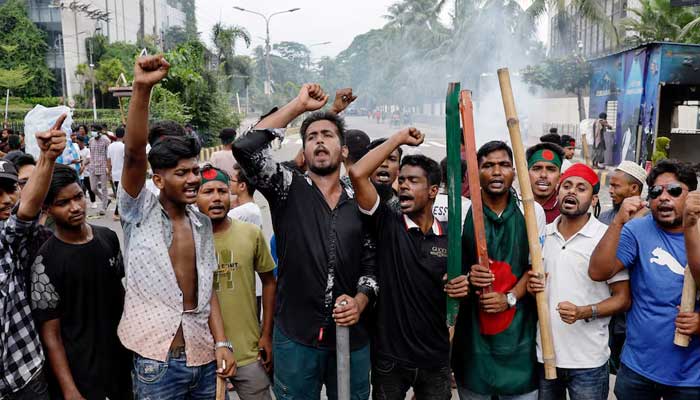
Among these are arbitrary detentions, mass arrests, and politically motivated prosecutions mostly targeted at supporters of Hasina’s party, the group said.
Torture in custody and use of the Special Powers Act continue, mirroring repressive tactics of the past, HRW said.
The interim government denies the charges.
‘July Declaration’
A charter called the ‘July Declaration’ after last year’s uprising has laid out the roadmap for democratic reforms.
Last week, Yunus said the interim government will hold a national referendum alongside the February parliamentary vote on implementing the charter for state reform, saying it will be implemented depending on the outcome of the referendum.
The charter will eventually become a part of the constitution if approved by the new parliament.
The July Charter seeks to reshape the country’s politics and institutions and give constitutional recognition to the 2024 uprising. ‘
It envisages increased representation of women, limiting the prime minister’s term, strengthening presidential powers, expanding fundamental rights and ensuring judicial independence.
Politics
UK councillor vindicated over false Palestine-related allegations
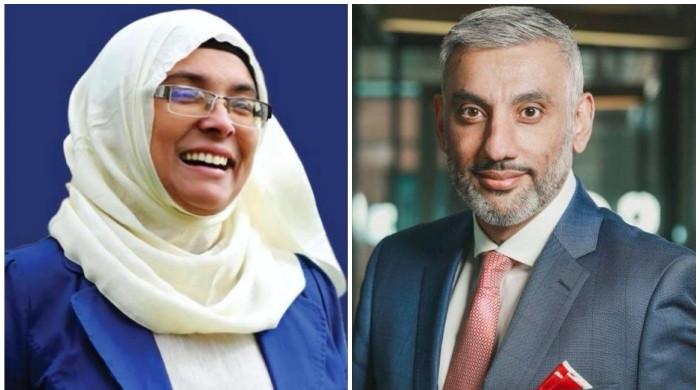
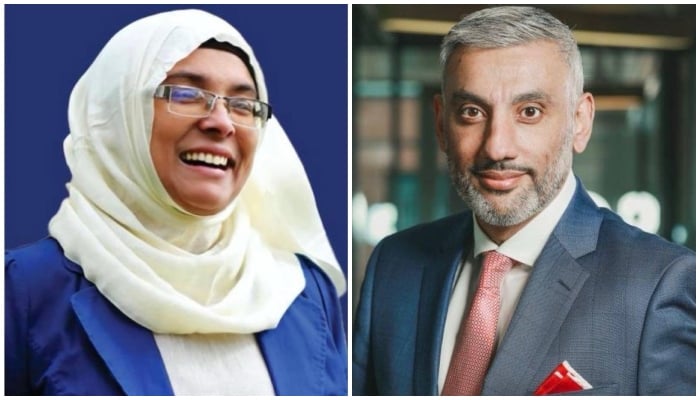
LONDON: A local authority with a large South Asian population has found that Independent Councillor Noor Jahan Begum breached the Councillor Code of Conduct after making a series of unfounded and serious allegations against Labour Councillor Tanweer Khan — using the issue of Palestine for local political gain.
The Redbridge Council Standards Committee’s ruling follows a detailed independent investigation and a formal public hearing. The Committee concluded that Councillor Begum misled the investigation, lied during the process, and colluded with her niece, who had submitted a separate complaint against Councillor Khan. Both women failed to disclose their family relationship, despite living at the same address.
Councillor Khan had alleged that on April 10, 2025, Councillor Begum distributed misleading leaflets against him in a local ward; that she behaved in a stalking manner outside the Ilford Islamic Centre on 18 April 2025; and that she engaged in misconduct while responding to this complaint, supporting her relative’s complaint on the same matter. The leaflets falsely alleged that Khan, as Chair of the Council’s Pension Fund Committee, was not supporting the “divestment” campaign relating to the Local Government Pension Scheme. They implied that he was pro-Israel, pro-Zionism, and anti-Palestine.
Councillor Begum denied all allegations. However, the Council found that on April 10 she was in her ward distributing leaflets and speaking to residents, and that she had made claims — including that Councillor Khan had behaved in a misogynistic manner — that were not supported by evidence. Regarding the allegation that she distributed leaflets outside the Ilford Islamic Centre in order to harass Khan, the Sub-committee made no findings, citing a lack of evidence that harassment had occurred.
The Sub-committee concluded that Councillor Begum made statements and allegations that were inconsistent with incontrovertible evidence. It agreed with the Investigator that she had deliberately minimised her involvement with the Redbridge Palestine Solidarity Campaign; falsely claimed she was not leafleting; downplayed her relationship with a member of the public by stating she only knew her from demonstrations, despite them being related; claimed Councillor Khan approached by car when CCTV showed he was on foot; denied delivering leaflets despite photographic evidence; and altered her statements during the investigation.
The Sub-committee found that in all these instances, Councillor Begum was acting in her official capacity. She used the title of councillor when making her complaint, her conduct related to her role as a councillor when making allegations against another councillor, and she participated as an elected member in a formal process concerning alleged breaches of the Code of Conduct.
The Council found that although the language used in the leaflets about Khan was extremely harsh, it fell within the bounds of freedom of speech. However, Councillor Begum’s dishonesty and her failure to act with integrity when making and supporting a complaint did breach the Code in relation to respect—because she made untrue claims capable of causing both personal and professional harm—and disrepute, as her dishonest behaviour brought her role and the London Borough of Redbridge into disrepute. Her actions eroded public trust by involving a closely related witness whose relationship with her was concealed.
Without offering her a right of appeal, the Committee recommended that Councillor Begum be removed from all committees for six months, attend training arranged by the Monitoring Officer within six weeks, and that the Monitoring Officer consider any further necessary action.
The investigation also raised concerns about the misuse of sensitive international issues to inflame local politics. Throughout the dispute, Councillor Begum portrayed Councillor Khan as aligned with pro-Israel positions, despite his long-standing, publicly documented support for Palestinian rights.
Speaking after the decision, Councillor Khan said: “The Committee’s ruling highlights how such claims can be weaponised to cause reputational and personal harm. My record on Palestinian rights is clear and a matter of public record. What my family and I have endured over these months has been deeply distressing, but I am grateful that the truth has now been established. I have supported the cause of Palestine all my life and I will always stand by the Palestinian people’s right to self-determination. I was hounded and defamed.”
He added that Councillor Begum had publicly demanded that Redbridge Council divest from companies such as Amazon, yet “records show that her own by-election campaign was financially supported by Capumen, a recruitment company that lists Amazon as a major client. This raises serious issues of political and moral hypocrisy.”
Councillor Begum said in a statement: “The Council did not follow due process. They failed to correctly investigate my complaint against Mr Khan and have publicly censured me for making a retaliatory complaint. I strongly disagree and will be making a complaint to the Local Govt Ombudsman.”
Politics
Pakistan’s JF-17 draws strong visitor interest at Dubai Airshow 2025

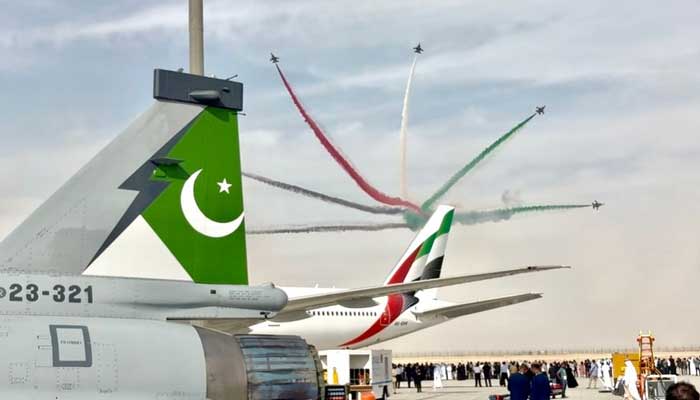
DUBAI: The Dubai Airshow 2025 opened at Al Maktoum International Airport on Monday, bringing together global aviation leaders, defence officials and industry experts for one of the region’s largest aerospace events.
Aircraft from Pakistan and the United Arab Emirates were parked side by side in the static display area, drawing attention from visitors who noted the close proximity of the two fleets.
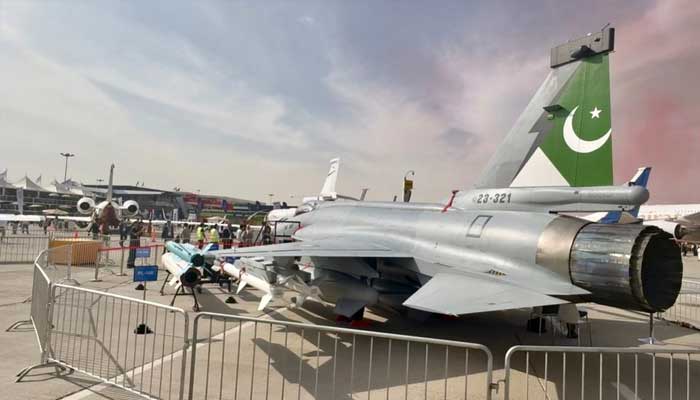
The arrangement was seen as a symbolic reflection of strong ties between the UAE and Pakistan in defence and aviation cooperation.
The skies above the airshow were dominated by colourful aerobatic displays as military and commercial jets performed precision manoeuvres throughout the opening day.

Crowds gathered around the runway and viewing stands as teams showcased high-speed turns, formations and signature stunts.
Pakistan’s JF-17 Thunder remained a major attraction. The multirole fighter impressed aviation enthusiasts with its agility during the aerobatic segment and later drew large groups of visitors at the static display.

Many attendees stopped to take photos of the aircraft and ask technical questions from the Pakistan Air Force officials present.
Pakistani pilots also became a highlight, with participants lining up for pictures and selfies following their performance. Visitors praised the professionalism and display routine of the PAF team, calling it “one of the best crowd-pullers” of the day.

The five-day airshow will continue to feature defence announcements, aircraft showcases and daily demos from international manufacturers and air forces.
Politics
Landslides in Indonesia’s Central Java kill at least 18, dozens missing
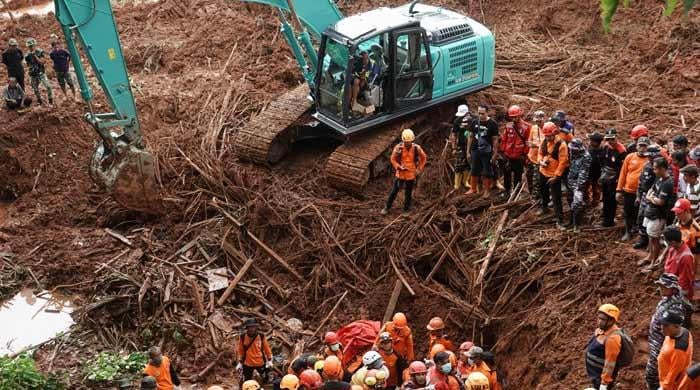
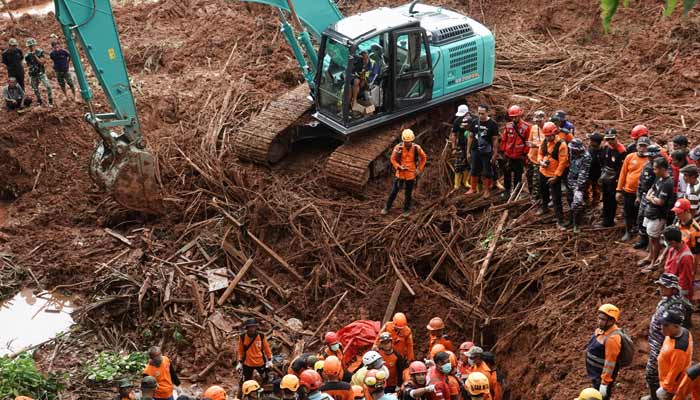
Rain-triggered landslides in two regions in Indonesia’s Central Java province last week have led to the deaths of at least 18 people, authorities said on Monday, with search operations ongoing.
A landslide in the city of Cilacap last week buried a dozen houses in Cibeunying village, said the disaster mitigation agency.
Search and rescue efforts were challenging as people were buried 3 to 8 metres (10 to 25 feet) deep, it said.
The Cilacap landslide has killed at least 16 people, with seven missing, said M Abdullah, chief of the search and rescue agency’s local division.
Excavators were deployed to dig through dirt in Cilacap, footage from news channel Kompas TV showed on Monday.
Separately, two people died and 27 were missing after a landslide on Saturday in the region of Banjarnegara in Central Java, the disaster mitigation agency said on Monday. As many as 30 houses as well as farms were damaged, it said.
The Southeast Asian country’s wet season started in September and is likely to last until April, bringing a high risk of extreme rainfall and flooding, the weather agency said.
-

 Tech1 week ago
Tech1 week agoFrom waste to asset: Turning ethanol production CO₂ into jet fuel
-

 Tech2 days ago
Tech2 days agoNew carbon capture method uses water and pressure to remove CO₂ from emissions at half current costs
-

 Politics4 days ago
Politics4 days agoBritish-Pakistani honoured for transforming UK halal meat industry
-

 Sports2 days ago
Sports2 days agoTexas A&M officer scolds South Carolina wide receiver after touchdown; department speaks out
-
Sports1 week ago
College football winners and losers: The catch of the year saves Indiana
-

 Business1 week ago
Business1 week agoMore than 1,000 flights cancelled as US air traffic cuts enter second day
-

 Sports1 week ago
Sports1 week agoTexas Tech’s Toppin scores 31 in season debut
-

 Politics5 days ago
Politics5 days agoInternet freedom declines in US, Germany amid growing online restrictions






